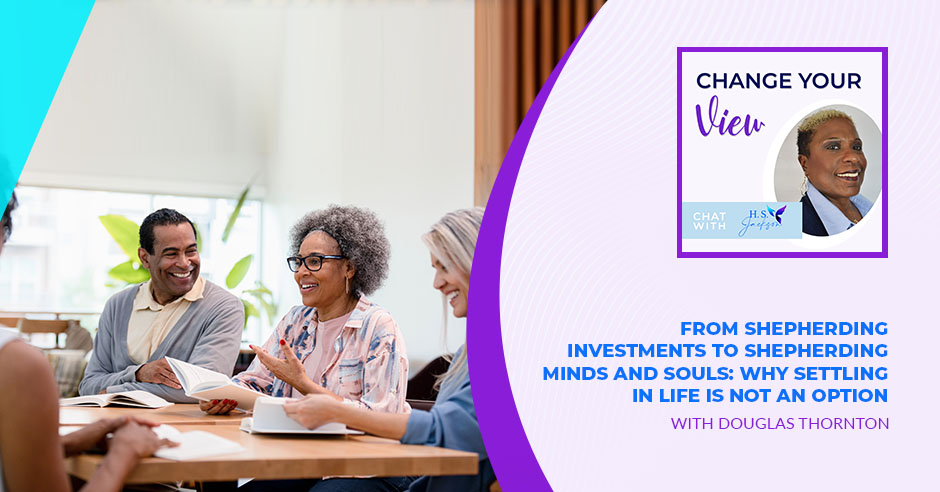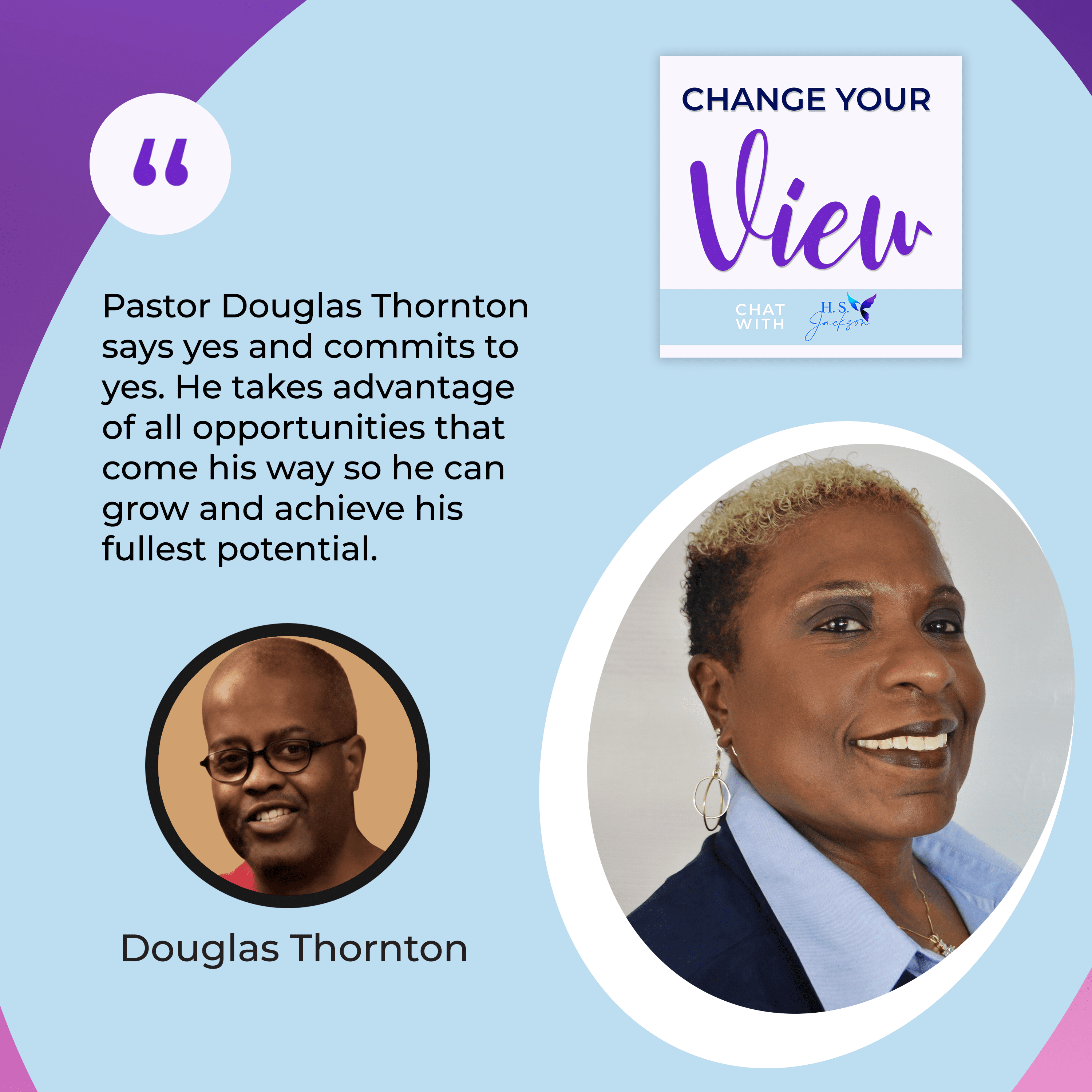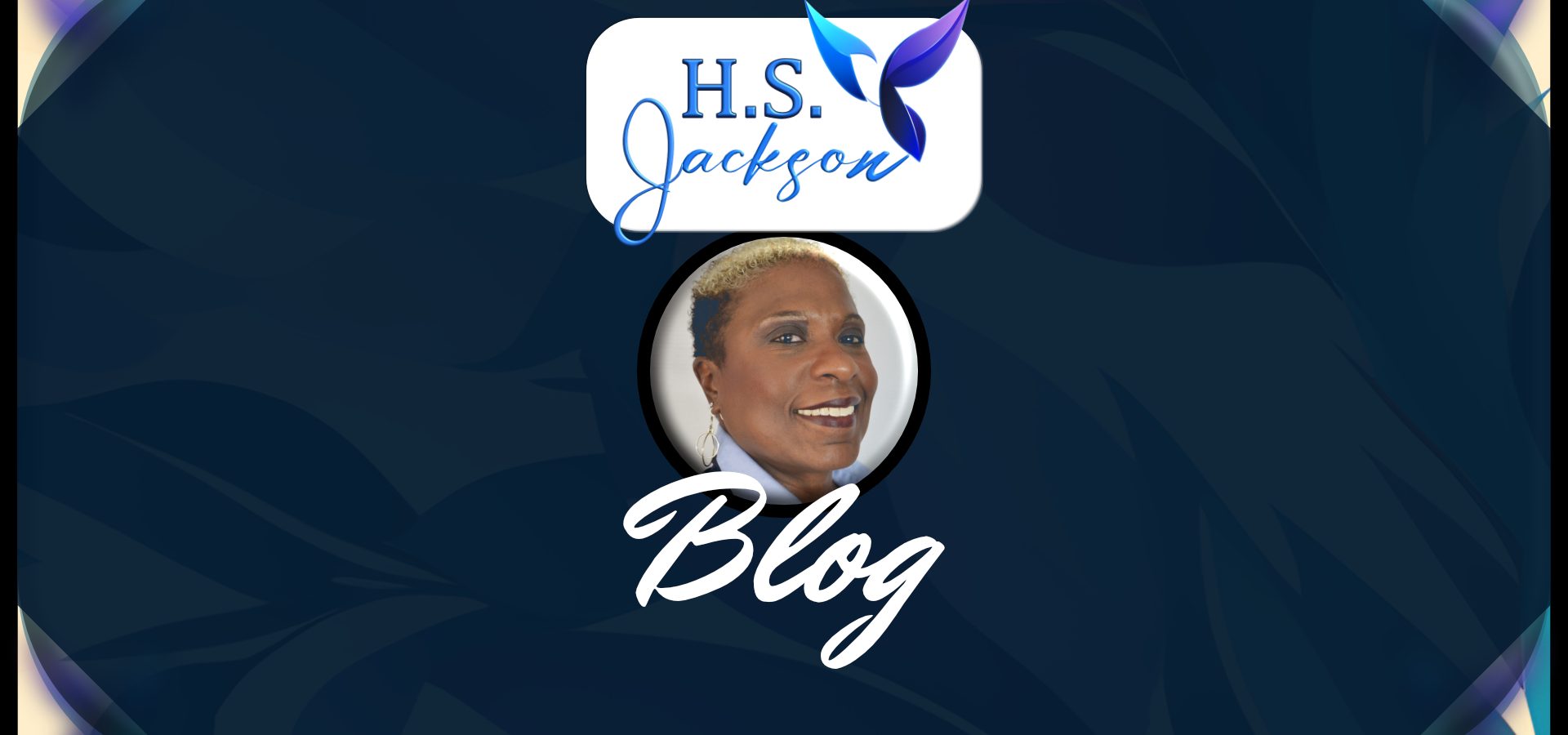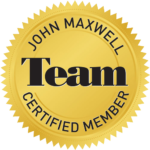
You can’t grow and be secure all at the same time. Would you rather stay in the same place and avoid all risk or go out there and claim your fullest potential? Pastor Douglas Thornton chose the latter. His journey from being a portfolio manager to becoming a pastor and educator is a reminder to all of us that settling in life is not an option if you want to grow and become the best you can be. Pastor Douglas believes that if you want to grow, you need to accept the fact that you won’t be secure all the time. When he took that risk himself, he found himself in a position where he can get the greatest fulfillment in life. Where are you in your journey now? Are you in that place of contentment, or do you feel like something is missing? Join in on this conversation and pick up some pieces of wisdom that will guide you along the way!
—
Watch the episode here
Listen to the podcast here
From Shepherding Investments To Shepherding Minds And Souls: Why Settling In Life Is Not An Option With Douglas Thornton
Welcome to Change Your View. In this episode, we will read the story of Pastor Douglas Thornton. Pastor Douglas Thornton worked as an Income Portfolio Manager with BMO Harris for over twenty years. One day, suddenly, life changed for him. Life changed and he had to get a new perspective. He had to change his view and go to where his spirit was leading them. He had to follow that calling that he had for his life. Let’s read his story and then when we come back here, we’ll discuss the tidbits and nuggets he dropped that we can apply in our lives. I’ll see you after this episode.

Pastor Doug, you were a Fixed Portfolio Manager for the Montreal Bank. Tell me a little bit about that because that was a six-figure job, I’m sure, or even more than that. You were there for 24 years.
I was a Fixed Income Portfolio Manager for the Bank of Montreal. I traded bonds. I was at the bank for 24 years. I had a number of roles. The last role I had at BMO was as a Fixed Income Portfolio Manager. It was a six-figure salary. Bonuses were hefty, very good bonuses. The money was good. I will say that although the money was good, I didn’t feel fulfilled.
The entire time I was at the bank, whenever I would have a conversation with someone, I would always tell them that if something ever happens, I’m going into education. That’s my passion. Even when I worked at the bank, I always read books about education. If there was some new policy that was introduced as it related to education, I read about it.
I read more books about education than I did about business. I was working in the business world at that particular time. I was always passionate about education. On my mother’s side, that’s what you have. You have educators and pastors. I’m doing both. I feel like it’s in my DNA, being a teacher, teaching math, as well as being a pastor. I feel like on my mother’s side, it’s in my DNA.
Imagine that. You went in a different direction, becoming a portfolio manager for 24 years and then suddenly, life changed. How did you feel? It seems to me that, ultimately, the creator was in the works because you kept hinting, “If something ever happened, I’m going to go into education.” It seems there was something always behind the scenes that was going to move you in that direction, regardless of what you wanted to do. It was going to happen.
On my mother’s side, there are educators and pastors so I feel like I’m a natural teacher. That’s how I feel. Others may not feel that way but that’s how I feel. It comes naturally to me that if I put forth the effort, teaching isn’t that difficult. Granted, you have to deal with students’ behavioral issues and other things but I feel that teaching for me is a passion. It’s not that difficult. I know it all anyway so that helps too. It was something that I always felt but never stepped out there to say, “I’m going to go ahead and get a Master’s in Education and go ahead and pursue teaching.”
At the time, I was making money at the bank. When you’re making money and you’re in a specific position, you don’t step out there to pursue your passions. You find yourself becoming comfortable and I hate to use the word even complacent at times. Not just in the career but in everything. The money’s good and you get up, go to work and come home. Whatever you would like to do, you have the resources to do it. You become comfortable.
When you're making money and you're in a specific position, you become comfortable. You don't step out there to pursue your passions. Share on XOne day, life changed. Tell me about that day when life changed.
2013, Monday morning and I did my normal routine. I took the Metro to work, got off the train, stopped the Dunking Donuts, grabbed some coffee and had bacon, egg and cheese on a croissant sandwich. This was before they were putting them on croissants. They used to always put it in bagels. I always had mine on croissants.
I grabbed that, went to work, went to the bathroom, sat down at my desk and immediately, my boss came to me and said, “Can I see you for a minute?” I was like, “Sure.” We went into his office and always had this joke that whenever we went to his office, we would always say, “Do we need to close the door?” In normal circumstances, he’d be like, “No, you can leave the door open.”
This time, I said, “Do I need to close the door?” He was like, “Yeah.” I was like, “Okay.” I believe it was April 7th. It was the day of the NCAA championship. I always remember that in 2013. On that day, I was downsized after 24 years. It was like, “I don’t have a job anymore at BMO after 24 years of being with the company.” We had a very good conversation.
We talked about so many other things after he informed me that I was being downsized. He and I had worked together. He wasn’t even my boss when we started working but he became my boss. We talked about so many other things. Once people found out, people came into the office and said bye. I probably arrived at work by 8:15. At about 9:15, I was on my way back home.
You didn’t even see that coming, did you? There was no way. Did you ever have any inkling?
At the time, we had merged with a bank, M&I, up in Wisconsin. They cut other positions. This was their fourth or fifth round of cuts. I witnessed other people being cut. I didn’t think our trading desk would be impacted by it but it was. On that day, they not only downsized me but they downsized a few other people. Probably it was 6 or 7 of us who were downsized on that particular day of all colors, ages, everybody. That’s downsizing. It doesn’t see color or age. If the numbers are right, they do it.
How did you feel? What did you see? How did you get through that hurdle and get to the next steps? What were your next steps?
When it happened, I felt relief. I know that sounds odd. At times, I was the only African American in meetings and I managed money for corporations. I felt some relief from that. Also, I had two boys and my wife. The great thing about it, though, what I tell people is that while you’re working, make sure you save and invest. Don’t spend more than you make because that’s what got me through that one year. After I was downsized, I sat down with my wife, talked to her and said, “I want to take off a year and not look for work, not do anything and figure things out.”
While you're working, make sure you save and invest. Don't spend more than you make. Share on XWe had the means for me to do that for one year and I did that. During that one year, I did some soul-searching and realized, “I’ve always talked about pursuing education. What is it going to take for me to do this?” I concluded that it was going to take me going back to school to work on a second Master’s degree if I wanted to pursue it. I had made it up in my mind that that was something that I wanted to pursue and that’s what I did. I ended up going back to school to get a Master’s in Education from DePaul University.
I want to go back to how you see that was a route that you should go because you couldn’t see it with your physical eyes. What did you use to understand that was the direction? You spent some time reflecting and meditating. What did you do?
During that year, my prayer life went to another level. When I was making money, I might pray or not pray when I woke up in the morning. Once I was downsized, every morning, I had a devotion going on. I’m praying and reading scripture. My prayer life went to a whole other level. I think about the Israelites in the book of Exodus. After they witnessed all that God had done for them, there were times when they would forget about how God had delivered them, provided for them and sustained them.
I didn’t want that experience. I started thinking about times when God provided and sustained me. I did not want to forget about that. I said to myself at that time, “If this is something that God is truly calling me to do, that he’s a provider and a sustainer, he’s going to see me through it.” He allowed me to prepare myself financially while I worked in a situation in which I was, financially sound. I felt that by doing what I felt I was called to do, God was going to sustain me.
He had done it in the past. You know the story about me being a foster parent. He sustained me through that and so many other things. I was like, “If God did it then, he’s going to do it now.” That is what I placed my decision on. I felt that this was what God was calling me to do. If God is calling me to it, then he’s going to be with me. He’s going to sustain me. He’s going to provide for me and my family. He’s going to meet whatever need I have.
I want to fast forward because I didn’t know you during the time I met you. I don’t remember when. I’m always bad with years. I met you when I was taking a Discipleship 101 class. One thing that always resonated with me was you said in class one day, “Will you answer the call? What does it require for you to answer that call?”
It means you are saying yes. For me, it meant if I truly wanted to teach, I needed to go back to school so that’s what I did. Oftentimes, people feel that they’re called to do something by God then they start thinking about the work that’s required. They start thinking, “This is going to require more schooling or training.” They start thinking about the work that they’re going to have to do and the sacrifices that they’re going to have to make.
When they start thinking about that, they become discouraged. My thing is answering the call is getting beyond that discouragement that you feel when you realize that this isn’t going to happen. It’s going to require some effort on your part and in many instances, some major effort on your part. Are you willing to do it? Are you willing to answer the call? Are you willing to commit fully to doing what it is that you feel God has called you to do?
I feel like many individuals feel that there’s something that they want to do but then they allow the thought of, “What’s this going to require? How much work is this going to require? How much money is it going to require? How much time is it going to require? What sacrifices am I going to have to make?” Many times, people don’t want to do that. If you don’t want to make those sacrifices, then you’re not all in.
It’s interesting that you say that. I have returned to school and am pursuing my Master’s in Human Services. It is an eye-opening experience for me because I haven’t been in school in over twenty years. They have whole new waves that you have to respond to write your papers and stuff. I’m sitting here going, “What have I put myself into?” I’m having that angst because I have to learn a whole new way of writing and thinking that I didn’t have to do when I was in school. However, it is challenging and fearful because it’s something different.
It’s taking me out of my comfort zone. However, I know that in the end, it will be rewarding because it’s teaching me things that I never would have thought about. We have to be willing to put in that sacrifice, money and time if we truly want something. Otherwise, you’ll continue to coast along and do whatever comes to your way and drift, taking whatever life gives you instead of making and creating a life for what you want. I thank you for that. I ask you because I’m sure you’re still listening and meditating with God. You’re teaching in the school system.
I teach freshman math. It’s called Integrated Math in Whiting, Indiana.
How do you feel about that? Is that where you see yourself staying? What do you see as your next steps? What are you doing? What are you listening to? What are you hearing in your spirit about what you should be your next steps?
I’ve always felt that I bring a different perspective to education. Having had the opportunity to work in Corporate America for 24 years and being in this public arena of education, I bring a different perspective, I feel. Oftentimes, I see things differently than someone who’s been in education for twenty-something years. It’s like most professions.
If you’ve been there for twenty-plus years, you get stuck in doing things. You become what I call a traditionalist. We do things because this is the way things have always been done. Me having the experience that I had working in Corporate America then also being a pastor and having the opportunity to work on my first Masters in seminary, I bring that experience as well. That part of my life allows me to have the interaction with the students.
My students are freshmen. There are times when they do things and I want to get upset with them but then I have to say, “They’re fourteen. They’re supposed to say and do dumb things.” I’m not saying that they’re dumb students. It’s just you do things and we go, “That was dumb.” That’s more the spiritual side of me. I feel like every step and everything that I’ve done in my life leading up to this point has prepared me for where I am in my interactions with students and administration and my approach to teaching.
I take a different approach to teaching. Although I teach math, I feel as though teaching math isn’t teaching. You should be teaching students how to learn. I took on that perspective and that understanding from working in Corporate America, always having to learn something new. You haven’t been in school for twenty-plus years. Now you’re in school and you have to learn something new.
As I share with people all the time, teaching math is easy. The difficult part is convincing students that they can learn math. That’s most of us. The difficult part is convincing us that we can learn new ways of having to submit papers and reading textbooks online. You’re not buying textbooks. Everything’s online or taking an online course. You have to learn. I’m teaching math but my approach is more than about teaching math. It’s about teaching students how to learn.
That’s what teaching is. It’s the art and science of helping others learn. How do I convince my students that they can learn math, biology or English? It goes beyond teaching math. It’s more about teaching students how to learn and giving them strategies for learning. Once a student realizes that he or she can learn, I don’t care what comes their way. There’s nothing that they will feel will defeat them because they have strategies for learning. You also realize that it takes time to learn.
Teaching is the art and science of helping others learn. Share on XThat’s an interesting concept that you brought up there about teaching to learn. In some ways, that’s where we get angst and afraid. We think that to want to learn means that you are ignorant and you don’t know something, which means that you might have a weakness or a shortfall. Instead, we should see that as a strength because that means we’re opening our minds to new ways of thinking and thinking about new perspectives.
I love that you can get people in there when they’re young to help mold them and want to have that adventure because that’s what learning should be. I always say that learning should be an adventure. Don’t make it into drudgery. I’m thinking about even with my schoolwork, I’m learning things that I’ve never even thought about.
The Masters in Human Services, most people would be like, “What’s that?” It’s not psychology. However, Human Services deals with the environment surrounding the person that impacts their ways of thinking, beliefs and mindset. That’s what I want to dwell on. It’s to help people get more in tune with those elements instead of saying, “Everybody’s the same.” No, everybody’s not the same and they will not be the same.
We have to think that we are not all on the same playing field, background or benefits because that’s not true. I think about the young people that you’re coaching and mentoring. We had a discussion one time. There was a young boy who was trying to reach and who was opposed to wanting to learn. You had to be creative in trying to reach and bridge that gap.
That’s the beauty of teaching. If we could get rid of standardized testing and all of that and allow teachers to be creative in communicating their curriculum, you would see some creative teaching. Unfortunately, everybody’s concerned with standardized testing. You’re not teaching to learn. You’re teaching math. Either the students get it or don’t get it.
Come time for them to take the standardized test, either they know it or don’t know it. That’s one of the things. I’m reading a book about other ways to do assessments of students learning other than using standardized testing. Maybe we can get beyond that and allow teachers to teach their creativity because teaching is a calling. There are individuals who think, “I’m tired of doing this job. Let me go into teaching.” No. I tell people, “If you can’t deal with 1 person on a daily basis, imagine having 20 or 25 of them in a class with different personalities and you having to navigate your way through that and teach a curriculum.”
You have to navigate your way through the different behavioral issues and personalities. In addition to that, teach a curriculum. Teaching is a calling. It’s not something that you wake up one day and want to do. You think you do until you hit that classroom. You realize that you have about 6 or 7 months of this. That’s why many people don’t make it after one year. That’s the beauty of answering God’s call and being all in. Whatever it is that God is calling you to do, there will be hard times and struggles.
There’s a great quote that I live my life by. It says, “Growth requires temporary surrender of security.” If you want to grow, you can’t grow and be secure all at the same time, especially if you’re learning something new. There’s going to be a temporary surrender of the security that you are experiencing. There’s going to be some angst, uncertainty and doubt. It’s all going to be there. The question becomes, “How do you overcome it and move forward?” That’s where the growth comes in.
Where do you see yourself going from here? Do you see anything past the teaching? What do you see as your next calling? We will continue to progress. This is not it for you. That’s what I want people to understand. Don’t think that this is one calling. You still will go in different directions. God wants you to teach. I get that part. What else do you see as being your next step?
I want to become like you. I want to become a publisher or an author of a book. For me, it’s more so I want to introduce a policy. I do want to become a policymaker as it relates to education. I always feel that I bring a unique perspective to whatever environment I’m in. If given the opportunity to become a policy maker in this arena, that’s something that I see myself in maybe 3 or 4 years. I feel like this is my training ground. I can’t go into introducing policy if I don’t know about the terrain, students and protocol.
I’m being trained and given the opportunity to witness and see how things are done so that when I say, “This is how I think things ought to be done. I have that experience of working in an environment where things were done a certain way.” I would always be in the classroom. I love that interaction. I’ve taught online and it was okay.
We had to because of the pandemic. I was teaching at National Louis University. I was online with my students but online does not even compare to the actual classroom. It’s the interactions you have and the discussions. Someone disagrees with you. We are there face-to-face. If you are using Zoom or Google Meet, it doesn’t have that same feel. For me, policymaking and becoming an author but staying in a classroom if that means teaching one class.
I want you to leave one parting thought. You had to change your view and perspective to be where you are. What is a piece of advice you’d give to someone? You were working for 24 or 25 years at that bank and one day, life changed. We tend to get into that mindset of, “I’m here. I’ve been anchored here for twenty-something years and I’ll be okay. I don’t have this job. This job will always be here.” We cannot stay stuck somewhere thinking that that’s what is going to happen. Instead, we have to also look to continue to thrive in our life. What can you give someone a piece of advice to say that they have to keep pressing forward and don’t stay complacent in settling at a place or a job?
If you are in a position where you feel like you’re there because it provides the means for you to live a certain lifestyle but deep down within your soul or spirit, there’s something else that you want to do, get started with that thing that you feel called to while you’re working that job that you’re in. I didn’t get started until after I was downsized.
In hindsight, maybe I could have gotten started while I was working at the bank and maybe there would’ve been an opportunity for me to work at the bank in a capacity of teaching or something related to education. I don’t know. I always tell people, “If you feel God is calling you to something, get started.” We tend to want to say, “This is where I am so this is what I’m going to focus on. Once that ends, then I’m going to focus on this.” No. Allow things to overlap a little bit. If you’re working 8:00 to 5:00 and you feel called to do this, get started. Volunteer.
That was one of the things that I did after I was downsized. I began to do a lot of volunteer work. A lot of it related to the pastorate, my son’s school and then other things related to education. Anything that I could do to learn. That would be one thing I would say. Get started, even if you’re in a job that you’re not crazy about but it’s providing the resources for you to live to sustain the livelihood that you have. Get started with that.
Be open to every opportunity that comes your way. I don’t care how minuscule it might appear. Be open to it because it’s the small opportunities that can lead to something big. It’s the relationships that can open doors for you. While I was in school, I had some relationships that allowed me to do the internship where I did my internship. There was a relationship that allowed me to start working at National Louis University as an adjunct.
Be open to every opportunity that comes your way. No matter how minuscule it might appear, be open to it because small opportunities can lead to something big. Share on XBuild relationships. In my case being downsized, you don’t want to share that with everybody but then you realize that there’s a blessing when things happen to us. What we view as being detrimental or this horrible event can be a blessing to others. Share your stories with others because then you’ll realize that there are others who might have similar stories but there are also others who are experiencing what you experienced. You can minister to them while they’re going through that storm.
If you’re downsized, don’t be ashamed about it. It happens to everybody. Steve Jobs, the Founder of Apple, was fired from the company he helped found but he came back strong. Look at Apple now. It happens to many people. Don’t shy away from sharing your experience with people but most take advantage of every opportunity.
Success isn’t guaranteed I do feel that opportunities will present themselves. Sometimes they’re not major opportunities so people tend to ignore them. My mindset is I don’t care how small of an opportunity it is. I’m going to look into it and take advantage of it because I realize that that small opportunity can lead to something major.
I thank you for your time, Pastor Doug. You have given a lot of tidbits. The whole key is opportunity, being open and teachable, wanting to learn and going through that transition in your life to get to your true calling. At the end of the day, you always had it in your spirit that you wanted to teach. You felt that angst when you were sitting over there in Harrisburg, pulling in the money.
You kept saying, “The money looks good so I’m going to stay here.” The universe and God had a way of saying, “No, you’re not going to stay here. You are going to go and do what I know that you need to be doing.” That’s what we have to understand. You are not in control of where you need to be traveling. You have to put it in his hands, follow and be obedient and the rest will come. I thank you.
Many other plans in the man’s heart but it’s the Lord who directs his steps.
—
What an amazing interview that was with Pastor Douglas Thornton. He was a Fixed Income Portfolio Manager. He was there making a six-figure salary and one day, he was called into his supervisor’s office for a conversation that changed his life that put him in a different direction, placing him in the calling for his life. He is a teacher. He’s teaching young men and women. He’s a math teacher but he’s teaching them how to learn. That’s the key. We have to want to learn because as we want to learn and make learning our adventure, we will keep that same perspective throughout our life.
Another thing that he said that resonated with me is to say yes and be committed to yes. That means you take action. You put in the work, sacrifice and put in money and time. Also, you don’t spend everything that you make. You save up for that rainy day. That might be hard to do. However, if you put aside $20 every paycheck and then as you see more and more money becoming free, put more money aside from that paycheck because you never want to not have options. You do not want to not be able to take advantage of opportunities.
He took advantage of being downsized to go towards his passion and burning, driven purpose to be a teacher. Imagine if that hadn’t happened to him. Everything happens for a reason. We might think that what we want to do is the way to go but ultimately, that’s not the way to go. We have to let our hearts and minds lean into that spirit. Not lean into our understanding but into the understanding of the one who created us. Know that we have work to do and we have to be willing to put in that work and do the work to make a difference, be a difference and add value to this world and those around us.
I say to you, don’t settle. Don’t stay in a job. As Pastor Thornton said, he was there every day but he knew he was missing something. He finally got that wake-up call to understand what was missing. It was time for him to move on to teach and help others. I want you to spend some time thinking about what is driving you. What is feeding your spirit? What is it telling you to do? Follow and answer that call. Put in the time and effort. Do what needs to be done. Change your perspective and view. Until next time. Keep meditating and reflecting on what you need to do and follow.
Important Link
- Douglas Thornton – LinkedIn
About Douglas Thornton
 “To first love God, be concerned for the welfare of others, and to pursue our life long goals.” – Dr. Martin Luther King
“To first love God, be concerned for the welfare of others, and to pursue our life long goals.” – Dr. Martin Luther King
Praise the Lord!
My name is Douglas E. Thornton and I have grown to have a passion for learning about the Word of God. I began my walk with the Lord as a young man at the Apostolic Church of God where I served as a Sunday School teacher for the youth.
Church leadership and serving God’s people has always fulfilled my life in Christ. Over the years, I have served in various leadership roles from Christian Education, Men’s Ministry, Mentoring the youth, and teacher training.
Currently, I have the pastoral oversight responsibility for the Congregational Ministries at Victory. In this role, I serve as the Director of the Ministerial Alliance and Congregational ministries.
As an educator by profession, I hold the value of education close to my heart. I have pursued and gained a Bachelor of Arts in Economics, Masters of Arts in Theology, and also a Masters of Education in Educational Leadership. I currently teach Integrated Math to freshmen in Whiting Indiana
Spending time fellowshipping with family and friends is an important factor of living for me as well. I spend my free time golfing, reading, running or watching football. I also have been honored to be married to my wife, Kelley, for 23 years and we are the proud parents of two boys, Joshua and Nathaniel.




